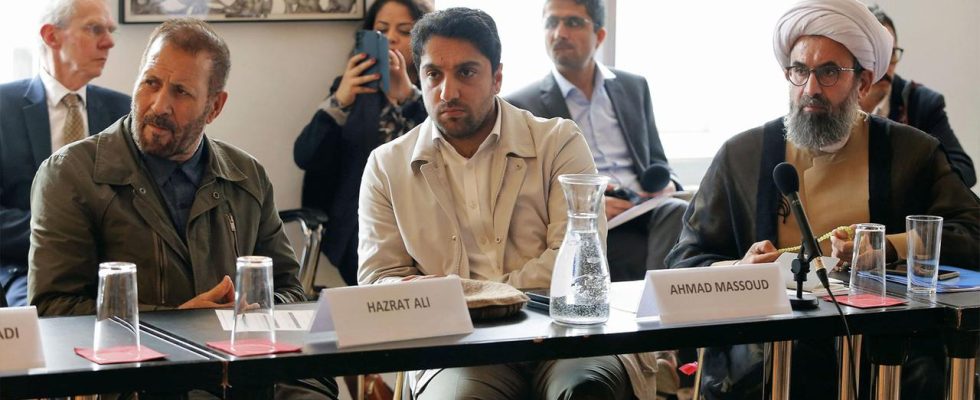In Afghanistan, the power of the Taliban seems to have been consolidated. But the opposition hopes to be able to drive them out in a few years – if the West helps. In Vienna she advised on ways to get there.
The clergyman Maskour Kabuli smiles a little tormented: “Oh, we are Afghans,” he says. “The fight against our ego comes before the fight against the Taliban.” The opposition to the Taliban lacks the solidarity of the different ethnic and social groups.
But here in Vienna, in the Bruno Kreisky Forum, progress has been made, it is now “under a common umbrella”, joint working groups have been agreed, and in the end there was a joint declaration.
“We have nothing”
Everything else sounds rather hopeless. Two dozen demonstrators stood in front of the old villa in the Heurigen district of Vienna-Grinzing, wanting to signal those inside: You are not alone. This is exactly what Ahmad Massoud laments after the meeting, which lasted several days: “We are completely alone and we have been given up. In the region, in the world. We have nothing.”
Massoud is the self-proclaimed leader of the Afghan opposition, but he is accepted by almost everyone here. He continues his father’s struggle. Ahmad Shah Massoud, better known in the West as “The Lion of Panjir”, was one of the main Taliban opponents and was killed two days before the attacks on the World Trade Center in New York.
Ahmed Massoud is trying to overthrow the Taliban from abroad. His father was a leading and notorious opponent of the Taliban.
“No longer a priority problem for the world”
That was long ago. Now, in gray and rainy Vienna, Ahmad Massoud is left with only the sober realization: “Afghanistan is no longer a priority problem for the world. The situation is: Afghanistan has been forgotten in a certain way!”
Or maybe gave up? Because the Taliban currently have unchallenged power in Afghanistan and are happy to demonstrate it?
When asked what he thought of the news that the Taliban had killed the mastermind of the Kabul airport attack in the summer of 2021, a leader of the terrorist group “Islamic State” (IS), Massoud rhetorically asked what mastermind really meant. He calls the message a tactical maneuver and uses the opportunity to equate the Taliban and IS: “What does IS do that the Taliban don’t do?”
The only difference is that the Taliban only carry out their terror within Afghanistan and the IS doesn’t care about borders: “The Taliban don’t give a damn about anything, what the world says, what the region says or what the people in Afghanistan say. “
appeal to the world
That will change, says Massoud; he has warmed himself up, and his colleagues at the table agree. However, his retrospect does not bode well: at the beginning you would have tried everything to talk to the Taliban. But they only wanted their opponents to capitulate.
All that remains for now is the appeal to the world not to hold the entire Afghan people responsible for this. The people of Afghanistan would not have allowed democracy to fail, Massoud implores those who are listening to him. They went to the polls and stood by democratic values and women’s rights – but lost everything.
Women want more support
A group of Afghan women are sitting in the conference room next door, discussing the joint statement. None of them wear a headscarf, only at the press conference, when the world is watching, a thin scarf is placed over the back of their heads.
Anya Yilmaz represents the cause of Afghan women and repeats what everyone knows: “The Taliban don’t accept women as human beings, they don’t accept them in roles outside the household.”
Everyone nods, but the more important message shouldn’t be forgotten: the women from Afghanistan, in the resistance, also urgently want more support, warns Yilmaz.
Hope for a fall of the Taliban
The mood at this second meeting of the Afghan resistance, supported by non-governmental organizations, is positive and combative. You pat each other on the back. Or is it a mutual clinging?
The “chaplain”, as he calls himself, Massoud’s comrade-in-arms Maskour Kabuli, is responsible for the hopes in Vienna – according to a very personal creed: “Without democracy I can’t breathe,” he says; he has been living in Germany for a long time. Kabuli also ventures a prognosis that all of the other respondents, without exception, have denied: “One year, two years, no more than five years,” and then the Taliban will be gone.
Meanwhile, the others are already distributing the “Vienna Declaration” of the Afghan opposition’s common ground. That was only the second meeting, there should be a third, fourth. In Vienna. Certainly not anytime soon in Kabul.

